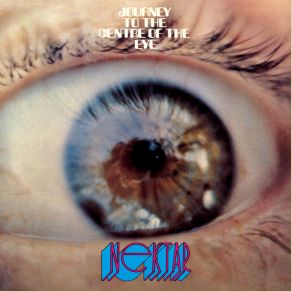Journey to the Centre of the Eye
Download links and information about Journey to the Centre of the Eye by Nektar. This album was released in 1972 and it belongs to Rock, Rock & Roll, Psychedelic genres. It contains 13 tracks with total duration of 42:03 minutes.

|
|
|---|---|
| Artist: | Nektar |
| Release date: | 1972 |
| Genre: | Rock, Rock & Roll, Psychedelic |
| Tracks: | 13 |
| Duration: | 42:03 |
| Buy it NOW at: | |
| Buy on iTunes $5.99 | |
| Buy on Amazon $7.99 | |
| Buy on Songswave €1.18 | |
Tracks
[Edit]| No. | Title | Length |
|---|---|---|
| 1. | Prelude | 1:26 |
| 2. | Astronaut's Nightmare | 6:26 |
| 3. | Countenance | 3:34 |
| 4. | The Nine Lifeless Daughters of the Sun | 2:54 |
| 5. | Warp Oversight | 4:10 |
| 6. | The Dream Nebula, Pt. 1 | 2:16 |
| 7. | The Dream Nebula, Pt. 2 | 2:26 |
| 8. | It's All in the Mind | 3:22 |
| 9. | Burn Out My Eyes | 6:35 |
| 10. | Void of Vision | 1:55 |
| 11. | Pupil of the Eye | 2:07 |
| 12. | Look Inside Yourself | 0:45 |
| 13. | Death of the Mind | 4:07 |
Details
[Edit]Nektar's debut album was one of their finest releases, saturated with abstract psychedelia and a wonderful science-fiction motif that is magnified through the rigorous but dazzling Mellotron of Allan Freeman and Roye Albrighton's nomadic guitar playing. Throughout Journey's 13 cuts, Nektar introduced their own sort of instrumental surrealism that radiated from both the vocals and from the intermingling of the haphazard drum and string work. With the synthesizer churning and boiling in front of Howden's percussive attack and Mick Brockett's "liquid lights," tracks like "Astronaut's Nightmare," "It's All in the Mind," and both "Dream Nebula" cuts teeter back and forth from mind-numbing, laid-back melodies to excitable, open-ended excursions of fantastical progressive rock. Just as Hawkwind was exploring the depths of outer space with their progressive tendencies on most of their albums, Journey to the Centre of the Eye musically probed the inner universe of the mind and body with its very own conceptual field trip. "Burn Out My Eyes" and "Warp Oversight" are let loose with buzz-saw vocals and hazy, undefined guitar chords which converge and fade into background rhythms, while the 54 seconds of "Look Inside Yourself" is a short, illusory voyage that ends too soon. Nektar's freewheeling sound is best felt on Journey and on their next three releases, as by the end of the decade, their progressive moods and ambient-like suites started to get harder and take on more of a mainstream feel.